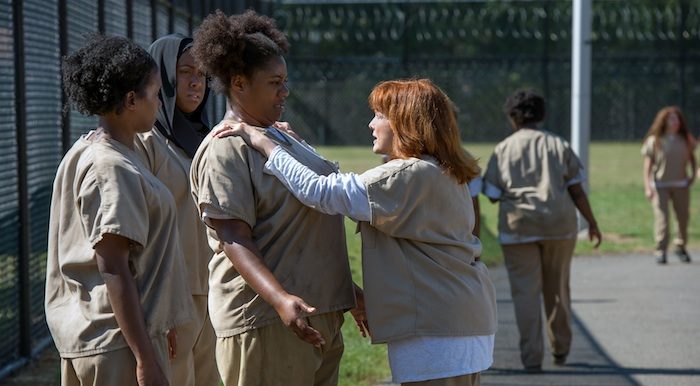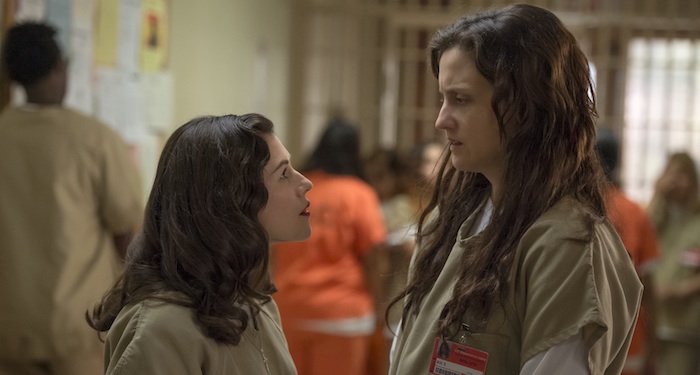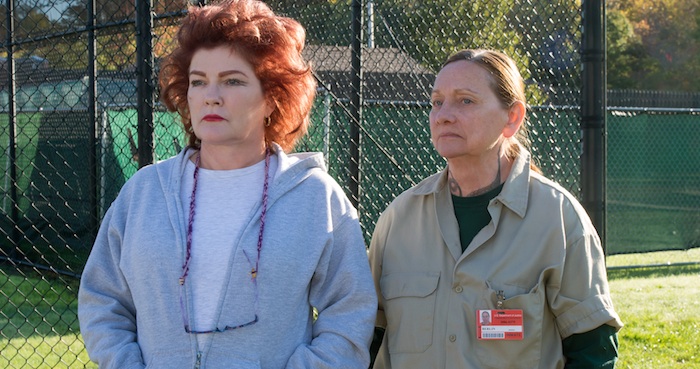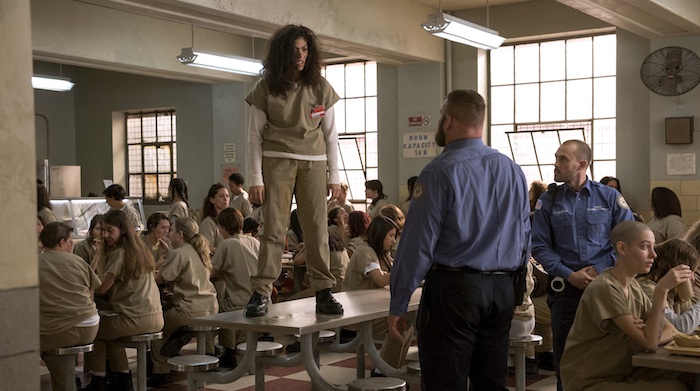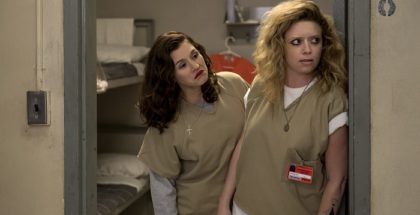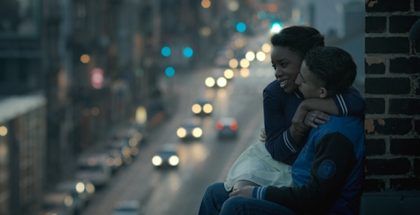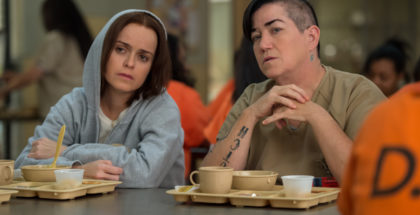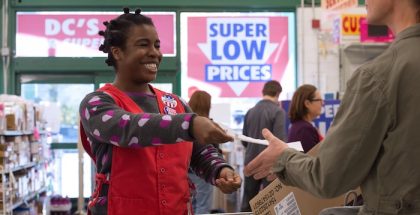Netflix UK binge-review: Orange Is the New Black Season 4, Episode 7 to 10 (spoilers)
Review Overview
Light
8Dark
8Looking past the surface
8David Farnor | On 01, Jul 2016
Watch Season 4 of Orange Is the New Black along with us: leave your comments below for Episodes 7 to 10, all spoilers welcome. Not caught up with Season 4? Read our spoiler-free review of the first four episodes here. (Warning: The below contains spoilers.)
“I think that I’ve been trying to win prison and I’ve destroyed people’s lives.”
Litchfield is full. That’s the inescapable fact slowly coming to bear on its inmates – and it’s turning what was once a harsh institution with occasional moments of levity and some element of humanity into a harsh institution, period. Nicky, who returns to Litchfield after Judy arranged her transfer, notices it straight away. “You’re married,” she’s says to Morello. “Piper’s a Nazi. I feel like I’m in an episode of the Twilight Zone.” It’s one of many, many funny lines, but make no mistake: things have taken a turn for the dark.
Exhibit A of that repeatedly seeps through the white bandage on Piper’s arm through these four episodes: the bloody branding of a swastika on her arm by Ruiz. It’s a shocking end to Episode 7, one that leaves you wincing and looking between your fingers. And yet it’s hard for it not to feel justified, after her own, shocking behaviour. In the bathroom, just minutes before, we see her surrounded by her gang out of fear. Safety in numbers, she tells herself, as she cringes at their cries of “white and proud”.
“I don’t think racism should be a group activity,” observes Morello, in the standout line of the episode.
Then Piper abandons Hapakuka, after several episodes of her being her loyal heavy. “I’m rooting for you,” says Piper, in what is surely her most self-centred act yet – and, let’s fact it, that’s saying something. (Taylor Schilling’s boyish, wide-eyed innocence, if we haven’t said it before, is perfect for Piper’s brand of petulant selfishness.)
“This isn’t what it looks like,” Chapman tells Nicky, when they meet again – even when confronted about it, she’s worried about what people will think of her, not of the impact of encouraging, well, racism.
“Sometimes, what it looks like is all anybody can see,” retorts Nicky.
What follows is a bravura exploration of image and reality, surface and substance. Judy King, for example, is embarrassed by the discovery of an old video from the 1980s, when she did a skit with a racially stereotyped puppet – something that she reaches out to Poussey to help correct, itself an act of racism, by presuming that all the black inmates move together in a group. She might be a racist, Judy admits, but she’s “the friendliest racist that you’re ever gonna meet” – which ranks somewhere alongside Piper in the privilege stakes, minus the formation of a white power group.
Orange Is the New Black, as ever, is able to examine these divides and prejudices, both intentional and unintentional, with humour as well as horror – the sight of Judy being chased down the hallway by Taystee and co. hoping for that candid photo (“High five!”) is laugh-out-loud funny. By the time they all end up on the same page (and Judy is less scared of the Black people she thinks are plotting to kill her), there’s something wonderful about them conspiring to snap a mobile phone pic of her snogging Cindy – not least because, instead of solving the problem, all it does is take us right back to the question of public perception vs. actual truth.
How brilliant it is that this comes in the most unexpected of forms: Lolly. “Just because you don’t see it, doesn’t mean it doesn’t exist,” she tells Healy, striking right at the heart of the matter, while also opening up her about own problems. Lori Petty is sensational in these episodes, adding real weight to her comic relief, as we see her move from passionate journalist to harmless conspiracy theorist to someone who is mentally ill. It’s a tragic arc, partly because she ends up in prison, a convenient place for society to put her, and partly because of Healy’s own experience with his mother. “It sounded nicer in my head,” she sighs, after voicing her offbeat musings aloud, only for Michael J. Harney’s Healy to deliver his own monologue on time, as they lean against cardboard boxes out the back of the prison – precisely where rumour has it there’s a time machine.
“Everyone wants to go back,” Healy laments, “to the moment when everything was still possible, before they made a wrong turn, so that they could go on the right path. But it’s not possible. All we can do is make the most of now.”
In a bold departure from the norm, Orange shows us Lolly’s story from her perspective, with voices whispering over the top of everything to convey her paranoia. When silence falls, it’s hugely effective, just as the shift in mood at Nicky’s welcome back party, thrown by Red, is overwhelming – a step further than the show’s usual knack for simply empathising with a character. (Even when Caputo drives past former CO Wanda Bell, now working as a lollipop lady, we pause for a second to get her reaction.)
Caputo, of course, is also fighting a war of perception and awareness, as his idea of educational courses is twisted by MCC to become more “vocational”. And so minor changes turn his arts program into a construction workshop, which amounts to the inmates toiling in the yard to build a new outbuilding. They might spend the time ogling the (frankly hot) foreman teaching them “safety”, but by the end of the day, it’s clear that this isn’t a class: it’s basically a chain gang. “It’s a school,” insists Linda in Caputo’s kitchen. “Otherwise, we’d have to pay them 11 cents an hour.”
Beth Dover remains brilliant as the company woman, protesting in private that Caputo can’t distinguish between her as a person and her work – a point she makes with exactly the same professional smile she uses to charm people in her day job. As much as we like seeing Caputo happy, it’s clearer than ever that their relationship isn’t going to last. You know, in case Linda pulling out a gun on Crystal Burset, when she turns up on Caputo’s doorstep demanding to know what happened to Sophia, wasn’t a clue that her morals are a little out of whack. (Caputo’s response? Tell Linda she’s hot and have sex with her. Oh, Caputo. Hashtag not all wardens.)
The best thing about that whole scene, though, is not the gun-toting or domestic disagreements, but the fact that we, at that point, also don’t know what’s happened to Sophia. Is Burset alive? Or is Caputo, promising she is, just lying? (You suspect not: while Linda is all about surface and corporate speak, Caputo is the opposite and can’t help but choose substance over surface.)
Nicky, of course, is another expert in honesty and appearances – sadly, because she’s had years of concealing her addiction from others. Seeing her back with Red, who leaps immediately into mothering mode (and can see right through her pretence), it hits home even harder how tragic it is that Nicky slipped back into her old ways just before she went back to the supportive embrace of her Litchfield group.
At the same time, though, drugs becomes something of a conduit for the truth between Piper and Alex – with Nicky, the pair get high in the middle of the prison’s vegetable patch, prompting Piper to admit, finally, to the racist mess she’s caused, and for Alex to join in with the admission of the dismembered dead body upon which they’re sitting. At the same time, Nicky swiftly identifies the shower pooper as Angie – on account of the pooper displaying trademark drug-dealing behaviour – leading to a superb dressing-down by Morello in the middle of the corridor. Humour, heart-to-hearts and human tragedy; Orange Is the New Black’s depiction of drug use is more complex than most dramas, let alone most comedies.
While Red moves to cut Nicky off from every drugs supply in the prison, she also plays tough mother to Piper, rebranding her Nazi symbol into what is effective a Microsoft logo. “When God gives you a swastika, he opens a window,” she growls. (We love Kate Mulgrew more than ever.)
Equally touching is the mother-daughter bond on display between Aleida and Daya, one that’s taken four seasons to reach any hint of satisfying reconciliation – and, while Daya’s pregnancy played a large part in that, you suspect it doesn’t hurt that Aleida is being set free. “Alright bitches. I’m out,” she declares in typically blunt fashion – and a brief glimpse of Daya’s face is all we need to know that she misses her. But Aleida misses inside even more; it’s rare that Orange ventures into the outside world, and it’s telling that it chooses to capture the struggle of rehabilitation (and readjustment after potentially becoming institutionalised) through a character who has never been the most sympathetic. Aleida’s abrupt outbursts in a diner are as rude as they are affecting, making her more intimate confessions all the more powerful. “It’s hard, and it smells like old farts,” she explains to her ex-boyfriend’s new girlfriend, after she starts spouting prison cliches. “But I got people in there.”
Despite these moments of hope – or, at least, relatively upbeat emotions – Orange Is the New Black is slowly tightening the screws beneath its surface. Ramos stops panty-trafficking, which might seem positive, but only threatens to put more pressure on Litchfield’s black market. Red finds her mirror has been stolen from her bedside cabinet and taken to the salon (now a front, in Burset’s absence), foreshadowing the war between cultures that has been rearing its head since Episode 1. Even Ruiz’s apparent gesture of kindness, ordering her women to let inmates set where they want in the canteen, is fuelled by calm ambition – she knows that being gracious with power will only make her appear more powerful and intimidating.
OITNB has consistently focused on the negative consequences of a privatised prison system in the last two seasons, though, so it’s fitting that the worst signs of things getting really dark come from the top down: if you thought Pornstache was bad, wait until you get a load of these new guards. Given leave by Piscatella to “go freestyle”, the officers are cruel to the point of torture.
Enter CO Thomas Humphrey (Michael Torpey), who turns upon Ramos, after suspecting her of being up to something during her panty-smuggling runs. He picks up on an earlier conversation between her and Flaca about whether they’d rather eat a whole load of dead flies or a live baby mouse – and, at gunpoint, makes her act that out in real life. At first, it’s an almost bizarre scene that feels unreal, but when the matter-of-factness of it sinks in, it’s one of the most unsettling things the show has ever depicted – the consequences of what happens when you hire soldiers to police a prison and give them freedom to exploit their power however they want.
Compare that to Coates, who apologises to Doggett for what he did to her in Season 3. It’s another complex situation that Orange doesn’t try to simplify or cast as black or white. Even James McMenamin’s delivery of his apology is stammering, awkward and unrehearsed enough to make it seem sincere. “If I could go back in time, I would have treated you like a person,” he says. “Not a duck, or a thing.” It’s a subplot that continues to challenge the idea of the ‘nice guy’ who deserves forgiveness, but it’s a moment that also highlights just how warped the relationships between the inmates and the other guards has become. The other guards, upon seeing Humphrey has taken Ramos, casually wonder whether he is raping her, almost with as little concern or surprise as Humphrey displays carrying out his sadistic act.
Trouser-drop searches. Racial profiling. Sexual abuse. It’s no wonder that the ladies of Litchfield begin to fight back against the people who are supposed to be there to protect and look after them – and that rebuttal is being led, in part, by Blanca, who steadfastly refuses to wash, no matter how often people tell her she smells, and, as a result, has managed to go without being strip-searched. Officer Dixon therefore orders her to stand on the table in the cafeteria, a move that he seems to think will humiliate her. A flashback to her past life, though, shows us an empowered woman, who learned as a put-upon carer how to stand up for herself in the face of an oppressive, dismissive white person. (When we say “stand up”, of course, we mean “mount a chair and bonk the brains out of the gardener, Diablo, while her elderly ward sleeps in her bed”.)
Standing on a table, then, is hardly an issue for Blanca. Sure enough, Episode 10 rolls around and she’s still there. Imagine, for a second, if you hadn’t binge-viewed to this point – you’d effectively leave her standing there for a whole week before continuing the story. More than Season 3, and perhaps Season 1 and 2, this fourth run proves that Orange Is the New Black is a show best savoured; it’s a series that rewards not rushing, with Episode 5 and 6 alone, for example, forming a double-bill with enough emotional ordeal to last a month.
Race remains an underlying divider here, too, with Blanca punished without hesitation, while Ingalls struggles to get punished, as she comes up with increasingly bold ways to try and be sent to the SHU to check if Sophia’s alive. The result, which sees her punch Gloria, is one of the funniest moments of the season to date. “I’d do it again… Latino!” shouts Ingalls, loudly and not in the least bit convincingly. Often, it’s the unspoken hate speech that’s the most dangerous.
Ingalls’ attempt to smuggle a phone into SHU inevitably fails, but there are two good things that come out of it: 1. We discover that Sophia is, actually, still alive (a discovery worth waiting for – again, not binge-viewing for the sake of it); and 2. We see that Caputo is still, at heart, a good guy, snapping a photo of Sophia and giving it to Danny to publicise anonymously.
Things, though, are darker then ever, as Taystee finds out when she puts on a screening of The Wiz for movie night. Sure enough, things kick off, as we’re reminded once again that the prison is full. The bad news? So is the SHU.
As the guards discover the body parts hidden by Alex in the veggies, even the ground outside Litchfield is stuffed to the brim with people. Where can they all go? With three episodes to go, something’s gotta give.
Orange Is the New Black Season 4 is available on Netflix UK, as part of an £9.99 monthly subscription.
What did you make of Episodes 7, 8, 9 and 10 of Season 4?


